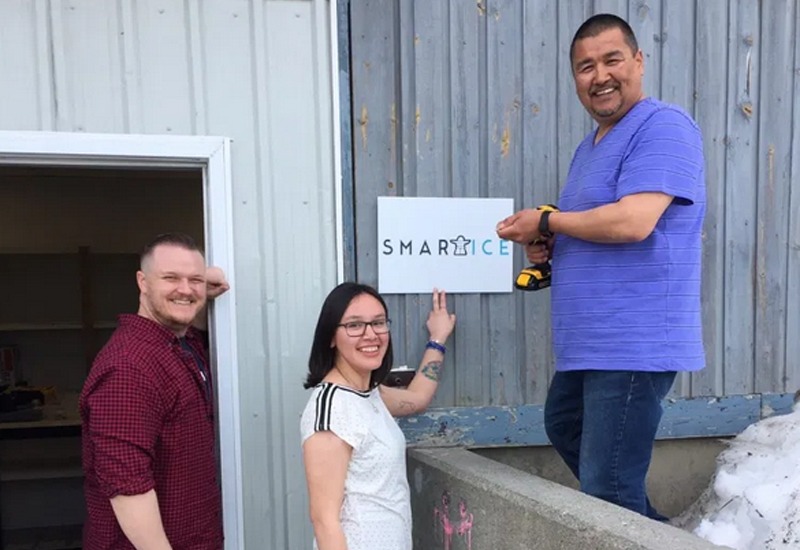Made in Nain

An award-winning partnership between Memorial University and SmartICE is providing young people in the North and at Memorial with opportunities to learn and grow.
The partnership is also helping Northern communities adapt to a changing climate.
The initiative has received significant accolades from the United Nations and was awarded the Arctic Inspiration Prize, among others. Most recently, it was the recipient of the 2020 President’s Award for Public Engagement Partnerships.
Early beginnings
The collaboration, spanning over a decade, has always been based in deeply engaged relationships between Inuit communities and Memorial University’s faculty, students and staff.
The focus on partnership began during development of the signature climate monitoring technology and collaborative concept, led by founding director, Dr. Trevor Bell, a Department of Geography professor in the Faculty of Humanities and Social Sciences.
From collaborative project to social enterprise
That same emphasis on collaboration, mutual contributions and mutual benefits continues today, with SmartICE operating as a not-for-profit social enterprise.
An example is the SmartICE Northern Production Centre in Nain, Labrador.
As part of that operation, Inuit youth from the community are hired to support the manufacturing of SmartBUOY monitoring devices. The up-skilling support provided through SmartICE increases workplace skills and employability.
Rex Holwell is SmartICE’s northern production and regional operations lead for the Nunatsiavut region. He lives in the community, and part of his role includes leading the youth cohorts, from recruitment and orientation, to training and production.
“One of the biggest things is having local people here doing the training and working with the youth,” he said.
The SmartICE team takes a personalized approach, in some cases helping pave the way for youth to participate in the program, like providing contacts for childcare or co-ordinating with other support organizations.
The helpful approach extends beyond the time the youth are actually part of SmartICE program, too.
“We tell the youth participants that we’ll actively help them look for work while they’re with us, or even after they’re done the course,” said Mr. Holwell. “If you see a job ad, give me a call. I’ll help you update your resumé and I’ll be your reference.”
“The SmartICE social enterprise was conceived in response to urgent community priorities and the need for solutions that respect Inuit Qaujimajatuqangit and benefit their communities,” explained Dr. Bell.
“Our Northern Production Centre in Nain is living testimony of how our novel actions and social innovations can support youth training and employment, economic development and community well-being.”
Student opportunities
Last summer, Memorial’s Centre for Social Enterprise, the School of Social Work and SmartICE worked together to facilitate the first internship at the Northern Production Centre.
The focus was on the well-being of the youth participants, with the goal of identifying and breaking down barriers to participation.
As an experiential learning opportunity, students helped develop SmartICE almost from Day One: developing policies, improving the technology and shaping programming. And the benefits are mutual. The relationship with Memorial means access to smart, motivated students who are willing to learn, contribute and grow.
As Dr. Bell noted, “Memorial University co-op students and graduates have contributed in many ways to the success of SmartICE, and in turn they have benefited from working with Inuit and the social enterprise approach to technology development and community partnership.”
Shawna Dicker, a fourth-year business student agrees.
She has worked with SmartICE in Nain, which also happens to be her home community, as a northern logistics co-ordinator, and will be starting a new position with SmartICE as a business development intern this January.
Ms. Dicker worked closely with Mr. Holwell, and another student, Todd Perry, from the School of Social Work to launch the first cohort of the youth program.
“It was different working with someone from outside my discipline,” Ms. Dicker said. “I didn’t see the emotional and human aspect of business. So often, it’s all about facts and figures, but working with Todd really brought out that other side.”
Together, the team developed the programming for the youth cohort, with a strong focus on building skills outside of just the actual technology fabrication. “
We wanted to create a social-emotional element to the program – we wanted it to be a safe space, so that youth would feel comfortable coming to me, Rex or Todd,” said Ms. Dicker.
Ms. Dicker’s experiences have also influenced her plans for the future. After she finishes her bachelor of arts degree, she plans to apply to the Faculty of Business Administration’s master of business administration in social enterprise and entrepreneurship degree program.
“In our growing social enterprise, students and graduates alike, are finding their work experience is helping to shape and grow the organization,” said Carolann Harding, executive director of SmartICE. “It’s truly a team effort.”
For information on SmartICE, visit here. For information about public engagement at Memorial and the President’s Award for Public Engagement Partnerships, visit here.